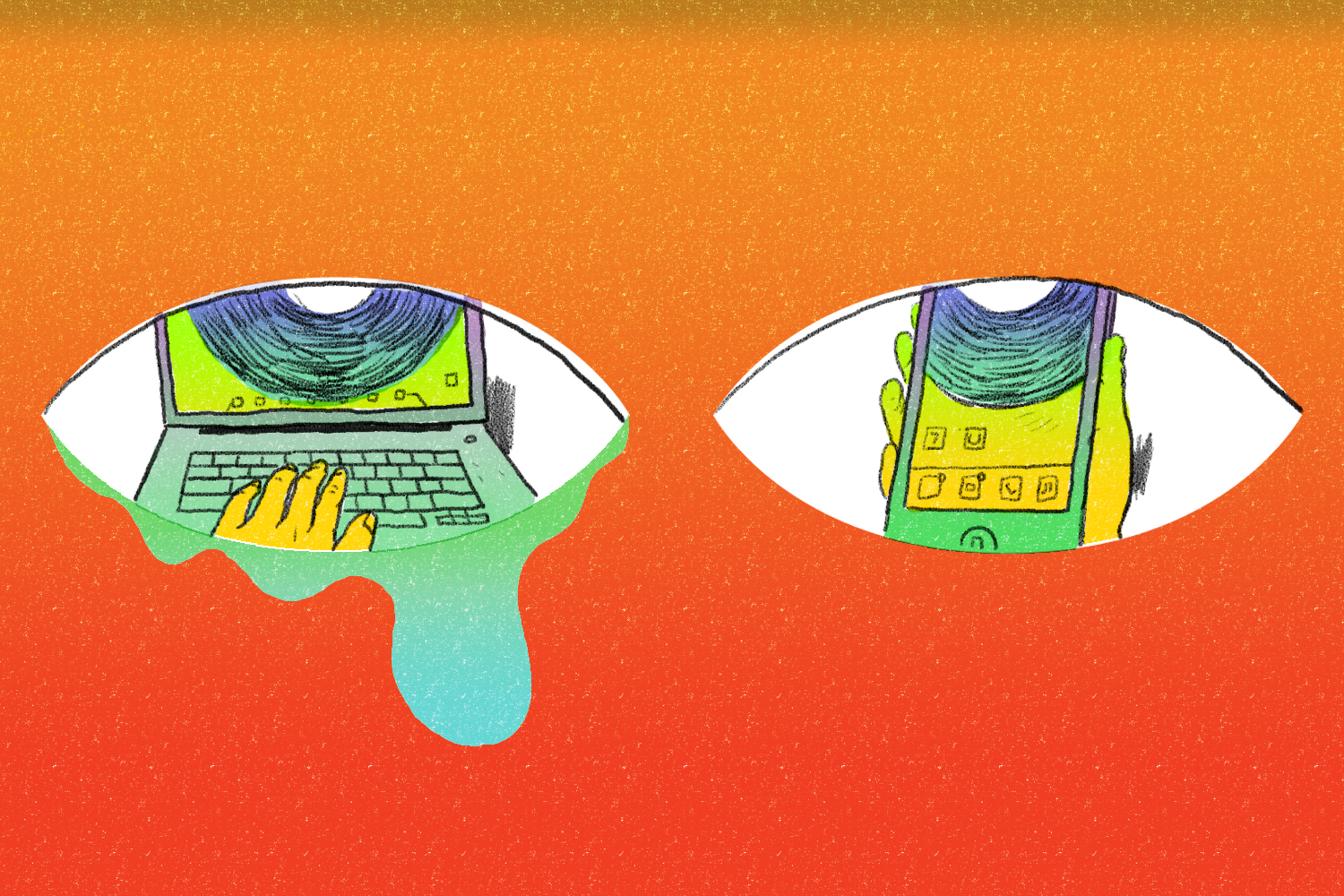
From sore eyes and blurred vision to headaches, doctors have a catch-all term for any screen-induced discomfort: “Computer vision syndrome,” says Dr. Joshua Dunaief, an ophthalmologist and macular degeneration researcher at the University of Pennsylvania. Dunaief says the specific causes of computer vision syndrome (CVS) are numerous, from improper reading glasses to an overly bright screen. But in most cases, any eye issues you’re experiencing stem from two root issues. Either your eyes are dried out, or they’ve become too fatigued to see properly.
“There are tiny muscles inside your eyeball that change the shape of your eye’s lens in order to bring whatever you’re seeing into focus,” Dunaief explains. After hours of sitting in front of your computer screen, those muscles can grow tired from focusing on a single fixed point. “In some cases, those muscles become so fatigued that your eyes can no longer focus,” Dunaief adds. He says research has also shown that when reading or working online, people tend to blink less. That can lead to dry eyes, tearing, or a burning sensation, he says.
While you’re not powerless to combat these problems (more on that in a minute), Dunaief says these issues are typically short-lived—meaning they go away within a few hours if you abandon your computer. But are there any serious, long-term dangers associated with digital screens?
“Possibly,” Dunaief says. “There’s evidence that bright light can damage your retinas irreversibly. That might mean staring at a computer screen that is very bright could damage your eyes.” He says there’s also some experimental evidence indicating regular exposure to computer-strength light could be damaging in similar ways.
Sitting too close to your computer screen (or holding your cell phone very near to your face) could also potentially lead to some vision problems, explains Dr. Joan Portello, an associate professor and researcher at the State University of New York School of Optometry. “A lot of people don’t realize this, but when you’re viewing something really close, that’s when your eyes are working the hardest—much harder than when you’re looking at something far away,” Portello explains.
Both she and Dunaief say there’s some evidence that students who spend many hours hunched over textbooks tend to become nearsighted. (Some Chinese schools have started employing metal desk bars to keep kids from lowering their heads too near to their study materials.) “Kids who play outside a lot tend to have better distance vision,” Portello adds. “And heavy computer use could turn out to cause some similar issues to this close textbook reading.” Like Dunaief, Portello says it’s too early to say how bad long-term computer use is for your eyes.
You Asked: Your Top 10 Health Questions Answered










One thing is crystal clear: Computers aren’t going anywhere. So what can you do to safeguard your sight? First and foremost, proper eyewear is essential—especially if you’re older than 40, when reading small print tends to become troublesome for most people, Dunaief says. “Your reading glasses aren’t made for your computer,” he explains. Ditto for your regular spectacles. “An optometrist can fit you for glasses made specifically for computer use that will make things easier on your eyes.”
Dunaief also recommends dimming your computer screen and moving it as far away from your eyes as comfort and readability allow. Enlarging the font, closing blinds, and turning down the lights in your office to prevent glare can also help keep your eyes safe, he explains.
Portello says eye drops or artificial tears can help, as long as you consult with your eye doctor first about which type will work best for you. She also recommends sticking to the 20-20-20 rule. “Every 20 minutes, look away from your screen at something 20 feet away for 20 seconds,” she advises. Why? This gives your eye muscles a rest and helps ward off fatigue and strain. Focusing on something even farther away is just as good, she adds. “And while you’re at it, try to blink as much as you can to keep your eyes moist.”
More Must-Reads from TIME
- Introducing the 2024 TIME100 Next
- The Reinvention of J.D. Vance
- How to Survive Election Season Without Losing Your Mind
- Welcome to the Golden Age of Scams
- Did the Pandemic Break Our Brains?
- The Many Lives of Jack Antonoff
- 33 True Crime Documentaries That Shaped the Genre
- Why Gut Health Issues Are More Common in Women
Contact us at letters@time.com